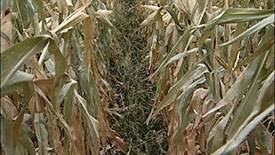Considering the importance of the African continent for future food production, and that roughly 70% of its population are subsistence farmers, this is no idle question.
But is the future of this region really dependent upon industrial agriculture methods, or is more organic and sustainable farming practices with emphasis on lower input farming the more practical long-term answer? How can productivity yields be increased while protecting the environment and the economic viability to the farmers and the local communities?
This is a complex, and unfolding story: climate change, poverty, war and political unrest, food insecurity, disease, primitive infrastructure, culture, and other factors, to varying degrees in Africa, preclude easy solutions.
In this article, Is Malawi’s ‘green revolution’ a model for Africa? — Malawi’s apparent success in reducing food insecurity, in part, is attributed to their government’s aggressive program to subsidize the cost of fertilizers for their poorest farmers, along with beneficial weather over the past several years. As one critic in the article inquires, is this prescription really sustainable in the long run?
This article, Africa ‘can feed itself in a generation’ by BBC science reporter, Neil Bowdler, reviews The New Harvest, a new book by Harvard University professor Calestous Juma who seems to offer a similar view for the future of agriculture in this region. According to Bowdler, professor Juma favors the use of GM crops, and greater mechanization on local farms. This high tech approach increases costs to farmers, and also requires a regimen of costly chemical inputs to sustain necessary yields. Given that many farmers in Africa are dirt poor, will this approach increase the risk of economic failure, even with modest yields, let alone from a disastrous season(s)?
Two major reports appear to offer a different approach for the future of agriculture in Africa, emphasizing good land stewardship practices, and minimizing input costs to local farmers.
The United Nations Environmental Program’s (UNEP) Organic Agriculture and Food Security In Africa 2008 report (pdf) includes the following recommendation:
Improving agricultural sustainability through adoption of organic agriculture in Africa may not be a solution to all the food problems, but considerable progress has been made in recent years. Whether organic farming will result in enough food to meet current and future needs in response to continued population growth and development in African countries can never be totally certain, but is certainly a step in the right direction. The present situation of widespread food insecurity means that conventional farming systems are clearly unable to fulfil the current food needs in Africa. The results observed in the transition to organic agriculture are highly promising for food security in Africa. Evidence indicates that productivity in organic agriculture can grow over time.
With further specific support, the benefits to food security and related improvements to natural, social and human capital, could spread to much larger numbers of farmers and rural people in the coming decades.
The International Assessment of Agricultural Knowledge, Science and Technology for Development (IAASTD) supported by over 400 experts from around the world, released the following statement announcing the release of their April 2008 report:
The way the world grows its food will have to change radically to better serve the poor and hungry if the world is to cope with a growing population and climate change while avoiding social breakdown and environmental collapse.
Last, in the spirit of Africa, perhaps the next best thing to being there, here’s a nice video slideshow of Africa from the Worldwatch Institute blog:
This post was written by Fred Gerendasy, a contributor to Cooking Up a Story as a writer and occasional interviewer. His current work is featured at Fred Gerendasy Photography.

